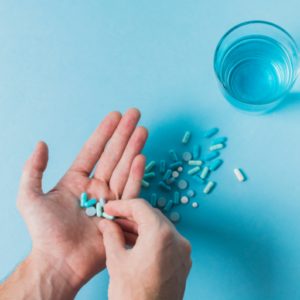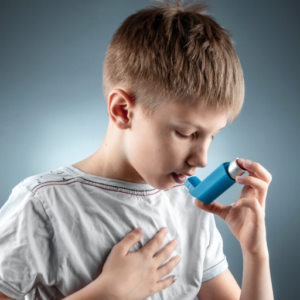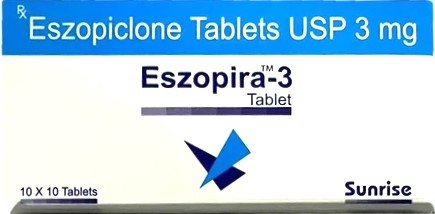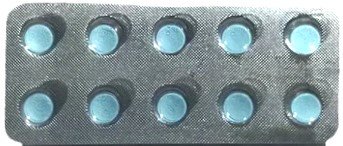Eszopira 3mg
| Package | Per tablet | Savings | Price |
|---|---|---|---|
| 180 tablets | $0.31 | $16 | $72 $56 |
| 150 tablets | $0.32 | $12 | $60 $48 |
| 120 tablets | $0.33 | $9 | $48 $39 |
| 90 tablets | $0.34 | $5 | $36 $31 |
| 60 tablets | $0.37 | $2 | $24 $22 |
| 30 tablets | $0.40 | – | $12 |
What is this medicine?
ESZOPIRA (Eszopiclone) is a sedative-hypnotic. This medicine is used for the short-term treatment of insomnia. It helps with falling asleep and staying asleep through the night by acting on the brain to produce a calming effect.
What should I tell my health care provider before I take this medicine?
They need to know if you have any of these conditions:
-
liver disease
-
kidney disease
-
a history of mental illness, depression, or suicidal thoughts
-
alcohol or drug abuse history
-
lung or breathing problems, including sleep apnea
-
muscle weakness (e.g., myasthenia gravis)
-
history of sleepwalking or unusual sleep behaviors
-
an unusual or allergic reaction to eszopiclone, zopiclone, zolpidem, zaleplon, or other medicines, foods, dyes, or preservatives
-
pregnant or trying to get pregnant
-
breast-feeding
How should I use this medicine?
Take this medicine by mouth with a full glass of water immediately before bedtime. Do not take it with or right after a high-fat meal, as it may reduce its effectiveness. Use only when you can get a full night’s sleep (7–8 hours).
Take exactly as directed by your doctor. Do not take more than prescribed. Prolonged use may lead to dependence or tolerance.
Overdosage: If you think you have taken too much of this medicine, contact a poison control center or emergency room immediately.
What if I miss a dose?
If you miss a dose and it’s still bedtime, take it only if you can get a full night’s sleep. Otherwise, skip the dose. Do not take a double dose to make up for a missed one.
What may interact with this medicine?
-
alcohol
-
other sleep medications or tranquilizers
-
antidepressants
-
antipsychotic medicines
-
medications for anxiety
-
opioid pain relievers
-
antihistamines causing drowsiness
-
anti-seizure medications
-
rifampin
-
ketoconazole or itraconazole
-
St. John’s Wort
This list may not include all possible interactions.
Inform your health care provider of all medicines, supplements, or herbal products you are using. Also mention if you smoke, drink alcohol, or use recreational drugs.
What should I watch for while using this medicine?
-
Use this medicine only for short periods (usually 1 to 2 weeks) unless advised by your doctor.
-
Do not drink alcohol while using this medication. It can increase the risk of serious side effects.
-
You may feel drowsy, dizzy, or less alert the next day. Do not drive or operate machinery until you know how the medicine affects you.
-
Rarely, people may engage in activities like driving, eating, or making phone calls while not fully awake. If this happens, stop the medicine and contact your doctor immediately.
-
Talk to your doctor if your insomnia does not improve or gets worse.
-
Do not stop taking this medication suddenly if you’ve used it regularly over time—this may cause withdrawal symptoms.
What side effects may I notice from this medicine?
Side effects that you should report to your doctor or health care professional as soon as possible:
-
allergic reactions (rash, itching, swelling of face/tongue/throat, severe dizziness, trouble breathing)
-
changes in behavior, confusion, hallucinations, agitation
-
suicidal thoughts or actions
-
memory loss or difficulty concentrating
-
unusual sleep behaviors (e.g., sleepwalking)
-
depression or mood changes
Side effects that usually do not require medical attention (report if persistent or bothersome):
-
bitter or metallic taste in the mouth
-
dry mouth
-
dizziness
-
drowsiness
-
headache
-
mild nausea
This list may not describe all possible side effects.
Where should I keep my medicine?
Keep out of the reach of children.
Store at room temperature between 20 and 25 degrees C (68 and 77 degrees F).
Protect from moisture and light.
Discard any unused medicine after the expiration date.
Do not flush medications down the toilet or pour them into a drain unless instructed.

























